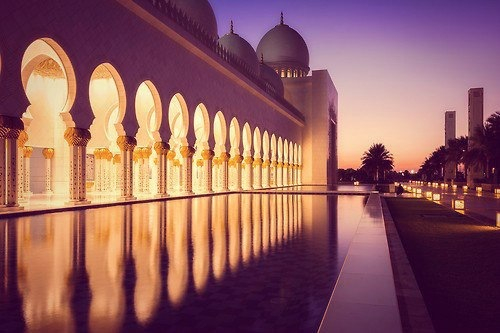The Rise of the Islamic Civilization: What are its unique features?

Building a civilization is not confined to a certain race or limited to a specific land. There is hardly any nation that has not participated in writing some of the pages which belong to the history of civilization. But what distinguishes one civilization from another is the lasting impact which it had on history, its degree of inclination towards humanity, the strength of its foundational belief system and its unique contribution to human progress.
Some sociologists define civilization as a "social system which helps man to increase his cultural output". Civilization consists of four main elements: economical resources, political systems, moral traditions, and science and arts. Among the contributing factors of building a civilization is its geographical location, religion, language and education. History proves that the collapse of any civilization results from destructive factors such as moral and intellectual decadence, lawlessness and the breakdown of social systems, the spread of oppression and poverty, the prevalence of apathy and pessimism along with the lack of competent and sincere leaders.
Civilization along history is usually passed from one nation to another and the more universal a civilization is in its message, the more humane it is in its inclination, the more moral it is in its direction and the more realistic in its principles, the more lasting will be its impact on history. When it comes to evaluating the Islamic civilization through examining its rising features, one would find that there are a number of contributing factors which helped in establishing the Islamic civilization. These include:
- It is based on the foundation of absolute oneness in belief. It was the first civilization that proclaimed the message of one God who has no partners or associates in His rule, and that He is the only one who is worshipped and the only one who is sought. This unique understanding of the concept of oneness had a great impact on developing the human intellect through liberating it from the shackles of servitude to kings, emperors, nobles or the hegemony of religious authority practiced by clergymen. The liberation of man from his fellow man led to the development of a vertical direction pointing upwards resembling unity and oneness. This belief found its way in Islamic art and literature and had an impact on developing Islamic philosophy. So the unity in the pattern of thinking is well reflected in artistic styles no matter how different they are. Researchers studying Islamic arts have noticed a unity of style and taste in different kinds of art so that a piece of Andalusian ivory, a piece of Egyptian textile, a piece of Syrian pottery and a piece of Iranian metal work, despite the differences in their forms and ornamentation, all have the same style and character.
- The second feature of the Islamic civilization is that it is human in its inclination, universal in its objectives. The Quran states clearly that humankind is one despite the differences in their races, nationalities and ethnic origins. Islam confirmed equality, justice, dignity and goodness as establishing factors of its civilization; this message attracted the attention of brilliant minds across the globe from different walks of life coming from different nations and various ethnic origins who contributed significantly in the intellectual output produced by the Islamic civilization.
- The third unique feature of the Islamic civilization is its strong moral principles which form the foundational base in all its systems be it political, economic, or family. Moral principles were also dominant in the field of scientific advancement and war engagements. Moral and ethical principles were an integral part in both legislation and in the implementation of these laws. Therefore, the Islamic civilization left a unique moral legacy which never supported that the ends justify the means.
- The fourth feature of the Islamic civilization is its keenness on the pursuit of knowledge in every field. Therefore, it addressed both the rational mind and the heart at the same time. It succeeded in provoking both emotions and thought. The value of the pursuit of knowledge led to the establishment of an intellectual system which was based on principles of truth and justice, religion and belief without religion being an obstacle to the development of the state or the progress of the civilization. From the mosques of Cairo, Cordoba, Damascus, Baghdad and Granada, the rays of knowledge spread across the globe. Knowledge is not the private property of any certain group but is available for all the those who seek it with no privilege given to clergymen, kings, nobles or rich men.
- The fifth and the last characteristic of the Islamic civilization is its unique sense of religious tolerance which treated people who have different or no belief equally and justly. No religious persecution took place, no discrimination based on religious adherence and no oppression of non-Muslims like what happened during the Spanish inquisition. The greatness of the Islamic civilization was manifested with being of only one religion yet it welcomed and invited all other religious groups and people.
 Arabic
Arabic French
French Deutsch
Deutsch Urdu
Urdu Pashto
Pashto Swahili
Swahili Hausa
Hausa
